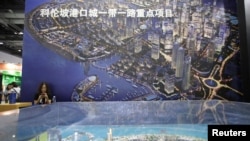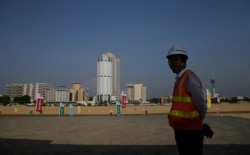Can a conscientious private sector in Western countries counter China's trillion-dollar "One Belt, One Road" initiative (OBOR) that is generously financed by state-owned banks and companies, often criticized for pushing recipient countries into debt and known for few controls on corruption and environmental destruction?
That is a question a new U.S.-led certification plan, the Blue Dot Network, seeks to answer by issuing "as a globally recognized seal of approval for major infrastructure projects, letting people know the projects are sustainable and not exploitative," according to the State Department.
A "blue dot" will be awarded to projects the initiative endorses.
The first meeting of the Blue Dot Network's embryonic steering committee was held in Washington this week, with Australia and Japan as partners.
Blue Dot has "enormous potential," according to the State Department's Keith Krach, who is under secretary for economic growth, energy and the environment.
"I've probably had 60 bilaterals with developing nations from Africa, South America, ASEAN countries, Central Europe and Central Asia and they're crying out for our leadership — the nations assembled here," said Krach at Thursday's session. "It's not just for good infrastructure. It's for trusted infrastructure."
The Blue Dot Network will not itself directly invest in projects, leading to questions as to whether it will have much impact if it is merely recommending certain initiatives for private bank financing.
"This is not intended to exclude anybody for membership. This is an open platform," said U.S. Deputy National Security Adviser Matt Pottinger, as he initiated the steering committee's first formal meeting at the Eisenhower Executive Office Building, adjacent to the White House.
At present the project is led by the U.S. International Development Finance Corporation (boasting access to $60 billion in capital), in partnership with the government-owned Japan Bank for International Cooperation and Australia's Department of Foreign Affairs.
China expected to 'fight back hard'
Still it pales in comparison to China's OBOR, which is cooperating with nearly 140 countries and several dozen international organizations.
"I am sure the Chinese will fight back hard," former U.S. ambassador to the Asian Development Bank Skipp Orr told VOA.
Analysts say it is premature to predict how effective the Blue Dot will be and whether it will be distinctive from China's OBOR.
"I think this idea, there is a dichotomy between the Chinese-friendly projects and the Blue Dot Network projects is probably a simplification of what we're going to see," according to Nicolas Veron, senior fellow at the Peterson Institute for International Economics.
Noting that OBOR is a major priority for the China-led Asian Infrastructure Investment Bank (AIIB), Orr added that the "Chinese will likely be pretty defensive about any effort that seems to chip away at AIIB priorities."
Blue Dot certification, according to Pottinger, will draw on existing good principles already set by other groups and international finance institutions and is not meant to create "a barrier to obtaining support for infrastructure projects, but rather to present Blue Dot Network membership as an advantage that will allow those projects to attract more capital than they might have otherwise be attracting."
Future partners
Besides U.S., Japanese and Australian officials, observers from several other governments considering joining the committee attended the meetings Thursday and Friday.
U.S. officials, who invited five news outlets, including VOA, to attend the first 30 minutes of the meeting on Thursday, declined to name which other countries were in attendance, only saying they included several countries across Europe and North America.
"Other partners will be announced in due course," a senior U.S. government official told VOA.
Pottinger compares Blue Dot to a gold standard or a Michelin star given to high-quality restaurants.
"We have to make a Michelin three star (the highest rating) through this Blue Dot Network," responded Tadashi Maeda, a governor for the Japan Bank for International Cooperation.
"The question is how do we move forward? How do we handle the financial capital?" asked Ambassador Katrina Cooper, the deputy chief of mission at Australia's embassy in Washington.
Cooper said Australia strongly supports Blue Dot because it is a "very powerful initiative."
The United States has committed $2 million of seed money for the steering committee, Krach announced Thursday.
The NSC official issued a public invitation to all other G-7 members to come on board.
U.S. officials are particularly interested to get India, a rival and neighbor to China, to come on board.
Trump is to travel to India in late February, a trip expected to focus on bilateral trade and investment.
"An obvious question about Blue Dot," noted Veron, "is depending on the results of the U.S. election in November will it be sustained?"



